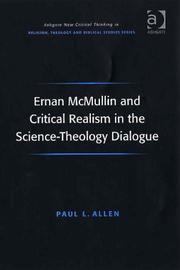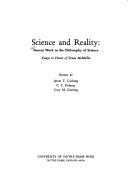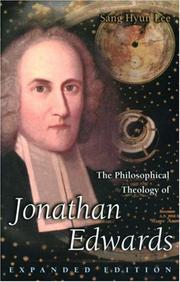| Listing 1 - 3 of 3 |
Sort by
|

ISBN: 1317141768 131714175X 1281097853 9786611097851 0754682447 9780754682448 9780754652830 0754652831 0754652831 9781317141761 9781281097859 6611097856 9781315580197 9781317141747 9781317141754 1315580195 Year: 2006 Publisher: Aldershot, England Burlington, VT Ashgate
Abstract | Keywords | Export | Availability | Bookmark
 Loading...
Loading...Choose an application
- Reference Manager
- EndNote
- RefWorks (Direct export to RefWorks)
Relying on the lifetime work of philosopher Ernan McMullin, this book expands our understanding of critical realism beyond a permanent stand off between the subjective and objective, whether in science or theology. Critical realism illuminates the subject and the objectively known simultaneously. Responding to criticisms made against it, this book defends critical realism in science and theology with a specific role to play in our understanding of God.
Critical realism. --- Philosophy, Modern --- Realism --- McMullin, Ernan,

ISBN: 026801714X 9780268017149 Year: 1984 Publisher: Notre Dame, IN : University of Notre Dame Press,
Abstract | Keywords | Export | Availability | Bookmark
 Loading...
Loading...Choose an application
- Reference Manager
- EndNote
- RefWorks (Direct export to RefWorks)
Science --- Physics --- Philosophy --- McMullin, Ernan, --- Science. --- -Reality --- -Natural science --- Science of science --- Sciences --- Truth --- Nominalism --- Pluralism --- Pragmatism --- Natural philosophy --- Philosophy, Natural --- Physical sciences --- Dynamics --- McMullin, Ernan --- -Philosophy --- Natural science --- Reality --- Normal science --- Philosophy of science --- Science - Philosophy --- Physics - Philosophy --- McMullin, Ernan, - 1924-2011

ISBN: 0691073252 Year: 1988 Publisher: Princeton (N.J.): Princeton university press
Abstract | Keywords | Export | Availability | Bookmark
 Loading...
Loading...Choose an application
- Reference Manager
- EndNote
- RefWorks (Direct export to RefWorks)
This book demonstrates the originality and coherence of Jonathan Edwards' philosophical theology using his dynamic reconception of reality as the interpretive key. The author argues that what underlies Edwards' writings is a radical shift from the traditional Western metaphysics of substance and form to a new conception of the world as a network of dispositions: active and abiding principles that possess reality apart from their manifestations in actions and events. Edwards' dispositional ontology enables him to restate the Augustinian-Calvinist tradition in theology in a strikingly modern philosophical framework. A prime example of Edwards' innovative reconstruction in philosophical theology is his conception of God as both eternal actuality and a disposition to repeat that actuality within God and also through creation. This view is a compelling alternative to the traditional Western doctrine of God as changeless actuality, on the one hand, and the recent process theologians' excessive stress on God's involvement in change, on the other. Edwards' achievement was that he saw dynamic movement as essential to God's own life without compromising the traditional Christian tenets of God's prior actuality and transcendence. The author of this volume also explicates the way in which Edwards' dynamic reconception of reality informs his theories of imagination, aesthetic perception, the knowledge of God, and the meaning of history. This expanded edition includes a new preface and a new appendix titled "Jonathan Edwards on Nature."
Philosophical theology --- History --- Edwards, Jonathan, --- Contributions in philosophical theology. --- Abrams, M. H. --- Addison, Joseph. --- Aristotle. --- Barth, Karl. --- Berkeley, George. --- Boyd, Gregory. --- Calvin, John. --- Carse, James. --- Clarke, Samuel. --- Fall of humankind. --- Flavel, John. --- Grean, Stanley. --- Grene, Marjorie. --- Gruenler, Royce G. --- Hartshorne, Charles. --- Holy Spirit. --- Hutton, James. --- James, William. --- Jüngel, Eberhard. --- Kant, Immanuel. --- Klaaren, Eugene M. --- Kuklick, Bruce. --- Lee, Sang Hyun. --- Loux, Michael J. --- Lovejoy, Arthur. --- Maritain, Jacques. --- McMullin, Ernan. --- Miller, Perry. --- Neoplatonism. --- Northampton. --- Owen, John. --- Spinoza. --- Trinity. --- White, Morton. --- Willey, Basil. --- Wordsworth, William. --- Yale College. --- conversion. --- deism. --- dispositional ontology. --- emanation. --- idealism. --- imagination. --- mysticism. --- occasionalism. --- pantheism. --- plastic natures. --- pragmatist. --- process theology. --- romanticism. --- substance. --- voluntarist tradition.
| Listing 1 - 3 of 3 |
Sort by
|

 Search
Search Feedback
Feedback About UniCat
About UniCat  Help
Help News
News